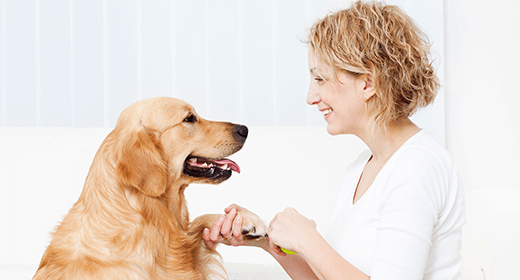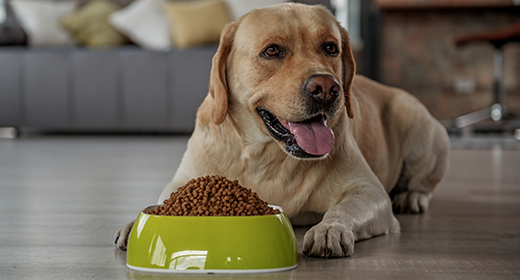

Traditionally, owners of large-breed and mature/senior dogs have known that their dogs may be predisposed to common joint and skeletal conditions—problems that may affect their mobility and overall wellness. The good news is that specially formulated diets and dog care products can help promote skeletal and joint health and assist in maintaining healthy cartilage.
Including specific nutrients in your dog's diet can help maintain healthy joints. Optimal levels of vitamins and minerals are found in IAMS™ dog care products and promote the efficient production of cartilage.
IAMS has formulas that are lower in fat and calories compared with our other adult maintenance formulas. Bones are the framework of the body, and the more weight added to the frame, the more stress joints experience. IAMS formulas such as IAMS™ ProActive Health™ Mature Adult are designed to help keep large-breed or mature dogs at an optimal weight to minimize joint stress.


No two dogs are alike. So when choosing your pet's food, you'll want to take into consideration the dog's breed, size, age, weight, and lifestyle.
Full growth will happen at around 1 to 2 years, with the exact age determined by your dog's breed—small-breed dogs mature faster than large-breed dogs. “Grown dogs, especially ones who are more athletic, will start to eat more quantities in one feeding,” says Madan Khare, DVM. “You want to limit his feeding to one or two times a day, depending on his activity level.” Exact quantities should be determined by consulting your vet or by reading the package labels (just remember to split a daily serving in half if you choose to feed the dog twice a day).
When transitioning your dog from puppy food to premium adult food—such as IAMS™ ProActive Health™ Adult MiniChunks —you want to do it gradually. “Never change a dog's diet abruptly,” Khare says. Here's a schedule for transitioning your pet from puppy food to an adult dog food.
Day 1: Fill your dog's bowl with 75% puppy food and 25% premium adult dog food.
Day 2: Use 50% of each food.
Day 3: Feed your dog a mixture of 75% premium adult food and 25% of your current dog food.
Day 4: Give him 100% premium adult dog food.
Daily exercise and a diet packed with high-quality protein from chicken, lamb, or fish and essential nutrients will keep him happy and healthy throughout his lifetime. Premium dry pet food has all of the daily nutrition your pet needs. It helps promote healthy teeth and gums, too.
“When it comes to feeding your dog human food, I have three words,” Khare says. “No. No. No.” Interfering with your pet's food regimen by adding higher-fat and higher-calorie human foods can disturb the animal's digestive system. When it comes to biscuits, Khare recommends looking for ones low in sugar, salt, and fat. 'You have to keep in mind that you're adding calories to his daily diet, so offer them in moderation,” Khare says. Finally, make sure your pet has a clean bowl of fresh water at all times.